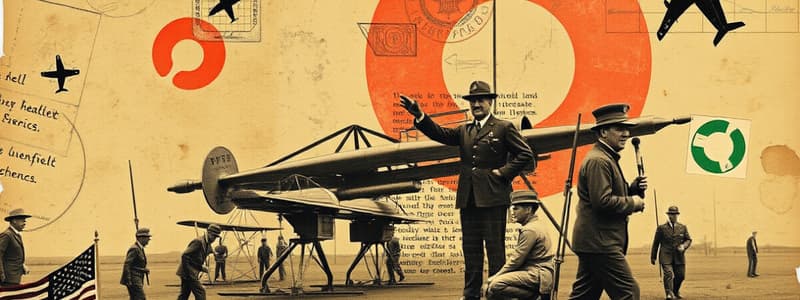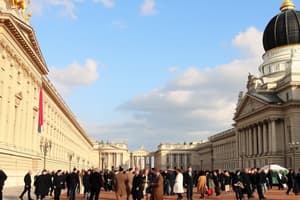Podcast
Questions and Answers
What is the international organization formed in 1920 to promote cooperation and peace among nations?
What is the international organization formed in 1920 to promote cooperation and peace among nations?
- European Union
- League of Nations (correct)
- World Health Organization
- United Nations
What system developed in the wake of World War I involving former colonies under European control?
What system developed in the wake of World War I involving former colonies under European control?
The mandate system
What were the reasons for the failure of the League of Nations?
What were the reasons for the failure of the League of Nations?
Lack of U.S. support, inability to demand obedience, lack of funds
Why was the mandate system created?
Why was the mandate system created?
What contributed to the world experiencing depression in the 1930s?
What contributed to the world experiencing depression in the 1930s?
What are some impacts of the Great Depression?
What are some impacts of the Great Depression?
What was the Great Depression?
What was the Great Depression?
What does U.S.S.R. stand for?
What does U.S.S.R. stand for?
Who was Joseph Stalin?
Who was Joseph Stalin?
What were Stalin's policies focused on?
What were Stalin's policies focused on?
Who was Benito Mussolini?
Who was Benito Mussolini?
What is fascism?
What is fascism?
What type of government did Adolf Hitler create?
What type of government did Adolf Hitler create?
What were the actions of Hirohito and Hideki Tojo?
What were the actions of Hirohito and Hideki Tojo?
What was the Spanish Civil War?
What was the Spanish Civil War?
What were the causes of World War II?
What were the causes of World War II?
What is nationalism?
What is nationalism?
What was the Treaty of Versailles?
What was the Treaty of Versailles?
What is D-day?
What is D-day?
What happened at Pearl Harbor?
What happened at Pearl Harbor?
Who was Franklin D. Roosevelt?
Who was Franklin D. Roosevelt?
Who was Harry Truman?
Who was Harry Truman?
Who was Winston Churchill?
Who was Winston Churchill?
Who was George C. Marshall?
Who was George C. Marshall?
Who was Douglas MacArthur?
Who was Douglas MacArthur?
Flashcards are hidden until you start studying
Study Notes
League of Nations
- Formed in 1920 to encourage international cooperation and maintain peace among nations.
- Ultimately failed due to lack of U.S. support, inability to enforce decisions, and insufficient funding.
Mandate System
- Developed post-World War I as a means for victors to govern former German and Ottoman territories.
- A controversial continuation of imperialism disguised as international administration.
Economic Impact of 1930s
- The world experienced severe economic depression largely due to high reparations imposed on Germany and protective tariffs.
- Consequences included high unemployment rates, widespread bank failures, and the rise of extremist political movements.
The Great Depression
- Characterized by global economic downturn and mass unemployment during the 1930s, resulting in significant social and political change.
Key Figures
- U.S.S.R: A former communist state in Eastern Europe and Northern Asia.
- Joseph Stalin: Leader who created a totalitarian regime in the Soviet Union through the purging of dissenters.
- Benito Mussolini: Prominent Italian fascist dictator known for his extreme nationalist and authoritarian policies.
- Adolf Hitler: Dictator who led Nazi Germany; utilized fascism to unify and militarize the nation in response to perceived threats.
Political Ideologies
- Fascism: A dictatorial political system rooted in extreme nationalism and intolerance for opposition.
- Nazism: An extreme form of fascism created by Hitler, emphasizing totalitarianism and racial superiority.
Japanese Expansion
- Under the leadership of Emperor Hirohito and Prime Minister Hideki Tojo, Japan expanded into Manchuria, China, and Korea to secure resources.
Causes of World War II
- Harsh penalties imposed on Germany after World War I contributed to rising tensions that eventually led to global conflict.
Nationalism
- Defined as a passionate devotion to one's country, often leading to the willingness to make sacrifices for the nation’s interest.
Treaty of Versailles
- The peace treaty that officially ended World War I, imposing significant reparations and territorial losses on Germany.
Key Events in World War II
- D-Day: On June 6, 1944, Allied forces led by Eisenhower launched the largest invasion in history at Normandy, marking a pivotal point in the war.
- Pearl Harbor: U.S. military base attacked by Japan on December 7, 1941, prompting the United States to enter World War II.
Leadership During the Wars
- Franklin D. Roosevelt: U.S. President during both the Great Depression and World War II.
- Harry Truman: Became Vice President under Roosevelt and succeeded him in office.
- Winston Churchill: British Prime Minister known for his leadership and persistence during World War II.
- George C. Marshall: Secretary of State who initiated the Marshall Plan for European recovery and offered aid to the Soviet Union.
- Douglas MacArthur: Chief of staff and commander of Allied forces in the Pacific theater during World War II.
Studying That Suits You
Use AI to generate personalized quizzes and flashcards to suit your learning preferences.




